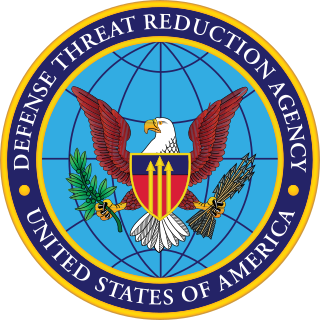Related Research Articles

The United States National Security Council (NSC) is the principal forum used by the president of the United States for consideration of national security, military, and foreign policy matters. Based in the White House, it is part of the Executive Office of the President of the United States, and composed of senior national security advisors and Cabinet officials.

A weapon of mass destruction (WMD) is a biological, chemical, radiological, nuclear, or any other weapon that can kill or significantly harm many people or cause great damage to artificial structures, natural structures, or the biosphere. The scope and usage of the term has evolved and been disputed, often signifying more politically than technically. Originally coined in reference to aerial bombing with chemical explosives during World War II, it has later come to refer to large-scale weaponry of warfare-related technologies, such as biological, chemical, radiological, or nuclear warfare.
Bilateralism is the conduct of political, economic, or cultural relations between two sovereign states. It is in contrast to unilateralism or multilateralism, which is activity by a single state or jointly by multiple states, respectively. When states recognize one another as sovereign states and agree to diplomatic relations, they create a bilateral relationship. States with bilateral ties will exchange diplomatic agents such as ambassadors to facilitate dialogues and cooperations.

The Bureau of Intelligence and Research (INR) is an intelligence agency in the United States Department of State. Its central mission is to provide all-source intelligence and analysis in support of U.S. diplomacy and foreign policy. INR is the oldest civilian element of the U.S. Intelligence Community and among the smallest, with roughly 300 personnel. Though lacking the resources and technology of other U.S. intelligence agencies, it is "one of the most highly regarded" for the quality of its work.

As the collapse of the Soviet Union appeared imminent, the United States and their NATO allies grew concerned of the risk of nuclear weapons held in the Soviet republics falling into enemy hands. The Cooperative Threat Reduction (CTR) program was initiated by the Nunn–Lugar Act, which was authored and cosponsored by Sens. Sam Nunn (D-GA) and Richard Lugar (R-IN). The purpose of the CTR Program was originally "to secure and dismantle weapons of mass destruction and their associated infrastructure in former Soviet Union states." As the peace dividend grew old, an alternative 2009 explanation of the program was "to secure and dismantle weapons of mass destruction in states of the former Soviet Union and beyond". The CTR program funds have been disbursed since 1997 by the Defense Threat Reduction Agency (DTRA).
Charles A. Duelfer is Chairman of Omnis, Inc., a consulting firm in aerospace, defense, intelligence, training, and finance. He is a regular commentator in the media on intelligence and foreign policy and is the author of Hide and Seek: The Search for Truth in Iraq.

The National Security Archive is a 501(c)(3) non-governmental, non-profit research and archival institution located on the campus of the George Washington University in Washington, D.C. Founded in 1985 to check rising government secrecy. The National Security Archive is an investigative journalism center, open government advocate, international affairs research institute, and the largest repository of declassified U.S. documents outside the federal government. The National Security Archive has spurred the declassification of more than 15 million pages of government documents by being the leading non-profit user of the U.S. Freedom of Information Act (FOIA), filing a total of more than 70,000 FOIA and declassification requests in its over 35+ years of history.

The Defense Threat Reduction Agency (DTRA) is both a defense agency and a combat support agency within the United States Department of Defense (DoD) for countering weapons of mass destruction and supporting the nuclear enterprise. Its stated mission is to provide "cross-cutting solutions to enable the Department of Defense, the United States Government, and international partners to Deter strategic attack against the United States and its allies; Prevent, reduce, and counter WMD and emerging threats; and Prevail against WMD-armed adversaries in crisis and conflict." DTRA is headquartered in Fort Belvoir, Virginia. The DTRA mission, organization and management, responsibilities and functions, relationships, authorities, and administration are defined in DoD Directive 5105.62, Defense Threat Reduction Agency (DTRA) .
The International Policy Statement of Canada is a policy statement, released on April 19, 2005, declaring Canada's intentions, attitudes, and plans to increase its global engagement in international security and foreign relations. Specifically, Canada's International Policy Statement focuses on diplomacy, development, defence, and commerce. According to the statement, Canada's defensive involvement will increase interaction with; rising global powers, fragile and failed states, putting emphasis on protection. The section on Canadian defence also includes combating the threat of global terrorism, renewing attention to peace operations, and expanding the defence of North America. The International Policy Statement's main development goal focuses on global poverty reduction. The commerce section outlines Canada's efforts to become a more active member of the global economy and the plan to cut and eventually cancel the national debt. Canada's interest in becoming a bigger part of the international community is motivated by past events such as its lack of influence in the Cold War and the recent rise in global Terrorism.

The Bureau of International Security and Nonproliferation (ISN) is a bureau within the United States Department of State responsible for managing a broad range of nonproliferation and counterproliferation functions. The bureau leads U.S. efforts to prevent the spread of weapons of mass destruction, their delivery systems, advanced conventional weapons, and related materials, technologies, and expertise.
This article deals with activities of the U.S. Central Intelligence Agency, specifically dealing with arms control, weapons of mass destruction (WMD) and weapons proliferation. It attempts to look at the process of tasking and analyzing, rather than the problem itself, other than whether the CIA's efforts match its legal mandate or assists in treaty compliance. In some cases, the details of a country's programs are introduced because they present a problem in analysis. For example, if Country X's policymakers truly believe in certain history that may not actually be factual, an analyst trying to understand Country X's policymakers needs to be able to understand their approach to an issue.

New Hanover High School is a high school located in downtown Wilmington, North Carolina. New Hanover High is the oldest existing high school in Wilmington. The original building was designed by William J. Wilkins. Construction started in 1919, and was completed in 1922. New Hanover High underwent a complete renovation at the start of the 21st century. It is a part of New Hanover County Schools.

William Flynn Martin is an American energy economist, educator, and international diplomat. Martin served as Special Assistant to Ronald Reagan for National Security Affairs, Executive Secretary of the United States National Security Council, and United States Deputy Secretary of Energy during the Ronald Reagan Administration. He was President of the Council of the University for Peace, appointed to the Council by Secretary General of the United Nations Kofi Annan. In 1992, he was Executive Director of the Republican Platform committee under George H. W. Bush. William Martin served for ten years as Chairman of the Nuclear Energy Advisory Committee during the administrations of George W. Bush and Barack Obama.
The G7-led Global Partnership Against the Spread of Weapons and Materials of Mass Destruction is an international security initiative announced at the 2002 G8 summit in Kananaskis, Canada, in response to the September 11 attacks. It is the primary multilateral group that coordinates funding and in-kind support to help vulnerable countries around the world combat the spread of weapons and materials of mass destruction (WMDs).

Bonnie Denise Jenkins currently serves as the under secretary of state for arms control and international security affairs. During the Obama administration, she was the U.S. Department of State's coordinator for threat reduction programs in the Bureau of International Security and Nonproliferation.

Gary Samore is the Crown Family Director of the Crown Center for Middle East Studies and Professor of the Practice in Politics at Brandeis University. He formerly served as the Executive Director for Research of the Belfer Center for Science and International Affairs at the John F. Kennedy School of Government at Harvard University.
Gift basket diplomacy is an approach to multilateral negotiation aimed at pushing forward progress on a particular issue without the requirement of consensus. The policy is most often seen in United Nations style diplomatic meetings where a particular group of countries wishes to take action or make a joint statement but is unable to do so without the consensus of all parties involved. Gift basket diplomacy fundamentally is collective action agreed by smaller groups of participants that goes beyond the lowest common denominator consensus that larger groups often reach in large multilateral fora. The United States first introduced Gift basket diplomacy in 2011 during the Nuclear Security Summit preparation process and more than 30 countries participated in fourteen Gift basket diplomacy statements at the 2012 Nuclear Security Summit in Seoul.

Matthew Bunn is an American nuclear and energy policy analyst, currently a professor of practice at the Harvard Kennedy School at Harvard University. He is the Co-principal Investigator for the Belfer Center's Project on Managing the Atom.

Harold Palmer Smith Jr. is an American professor, consultant, and expert on defense policy. He was Assistant to the Secretary of Defense from June 1993 to March 1996, when the name of the position changed to Assistant Secretary of Defense for Nuclear, Chemical & Biological Defense Programs, and remained in the position until January 1998.

Laura Susan Hayes Holgate is an American diplomat who has served as the United States ambassador to the United Nations International Organizations in Vienna and to the International Atomic Energy Agency since 2022 and previously from 2016 to 2017.
References
- ↑ Center for International Relations and Sustainable Development, , “Nuclear Security Summits - A Model for Multilateral Diplomacy”, Joan Rolfing 30 August 2017
- ↑ Bulletin of the Atomic Scientists, , “Keeping tabs on nuclear security commitments”, Michell Cann, Kelsey Davenport, Jenna Parker, 31 March 2015
- ↑ White House Press Briefing, , “Press Briefing with Jay Carney, Ben Rhodes, and Shawn Gallagher”, 27 March 2012
- ↑ Nuclear Regulatory Commission, FOIA Response, , “Group BV Records”, 26 March 2011
- ↑ Nuclear Regulatory Commission, FOIA Response, , “FOIA/PA-2011-0118”, 26 March 2011
- ↑ Stories from the Center of the Universe - Episode 103, , "Stories from the Center of the Universe - Episode 103
- ↑ Baseball Reference: Shawn Gallagher, , “Shawn Gallagher”
- ↑ Baseball Reference: Shawn Gallagher, , “Shawn Gallagher”
- ↑ Baseball Cube: Shawn Gallagher, , “Shawn Gallagher”
- ↑ North Carolina High School Athletic Association, , “North Carolina High School Athletic Association Record Book”
- ↑ Wilmington Star News, , “Ex-New Hanover star makes big leagues – the White House”
- ↑ Baseball Cards Come to Life, , “Baseball Cards Come to Life!”
- ↑ Stories from the Center of the Universe - Episode 103, , "Stories from the Center of the Universe - Episode 103
- ↑ MIT Nuclear Science and Engineering Alumni New
- ↑ Massachusetts Institute of Technology, , “A System for the Detection of Concealed Nuclear Weapons and Fissile Material aboard Cargo Containerships”